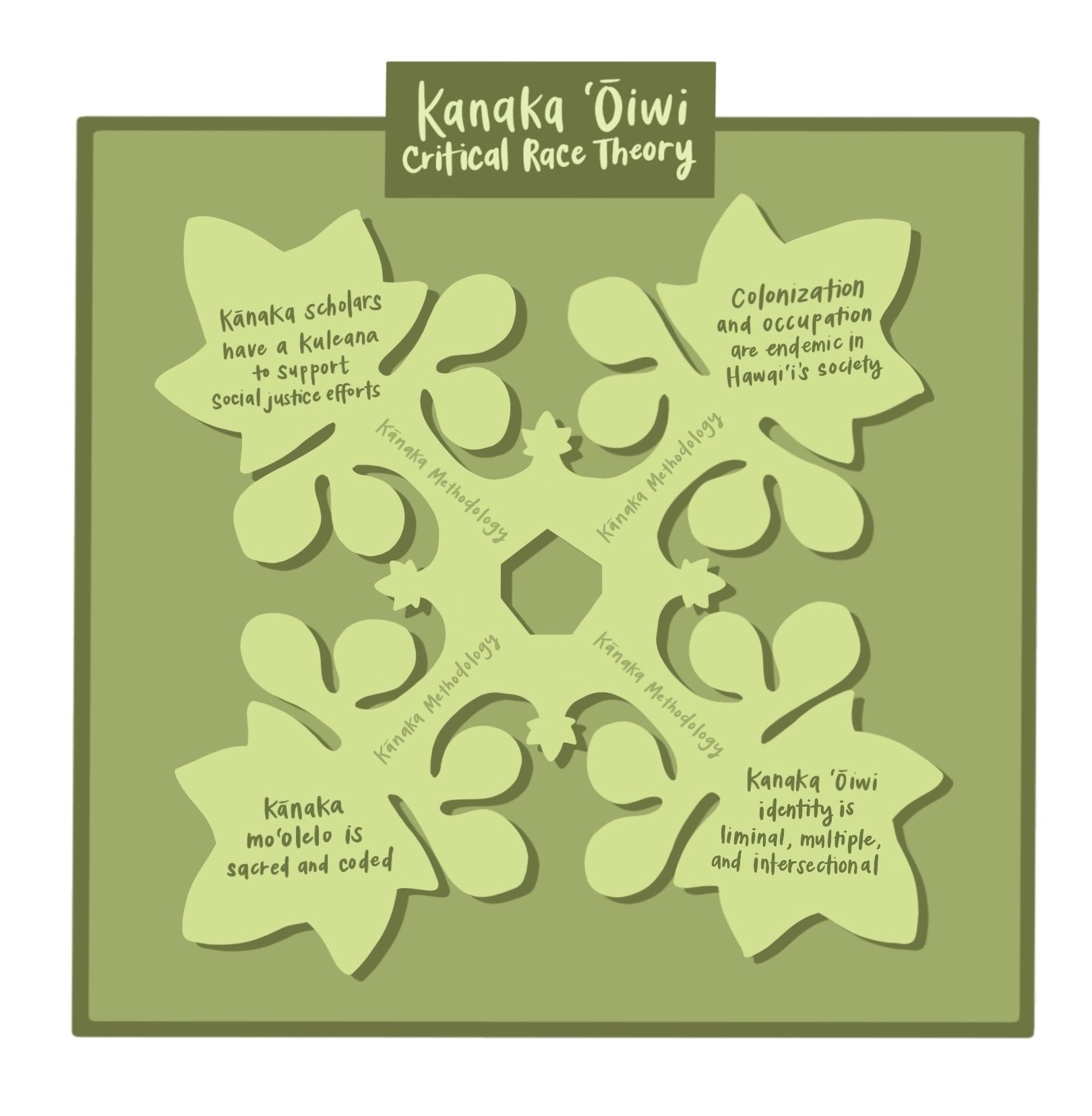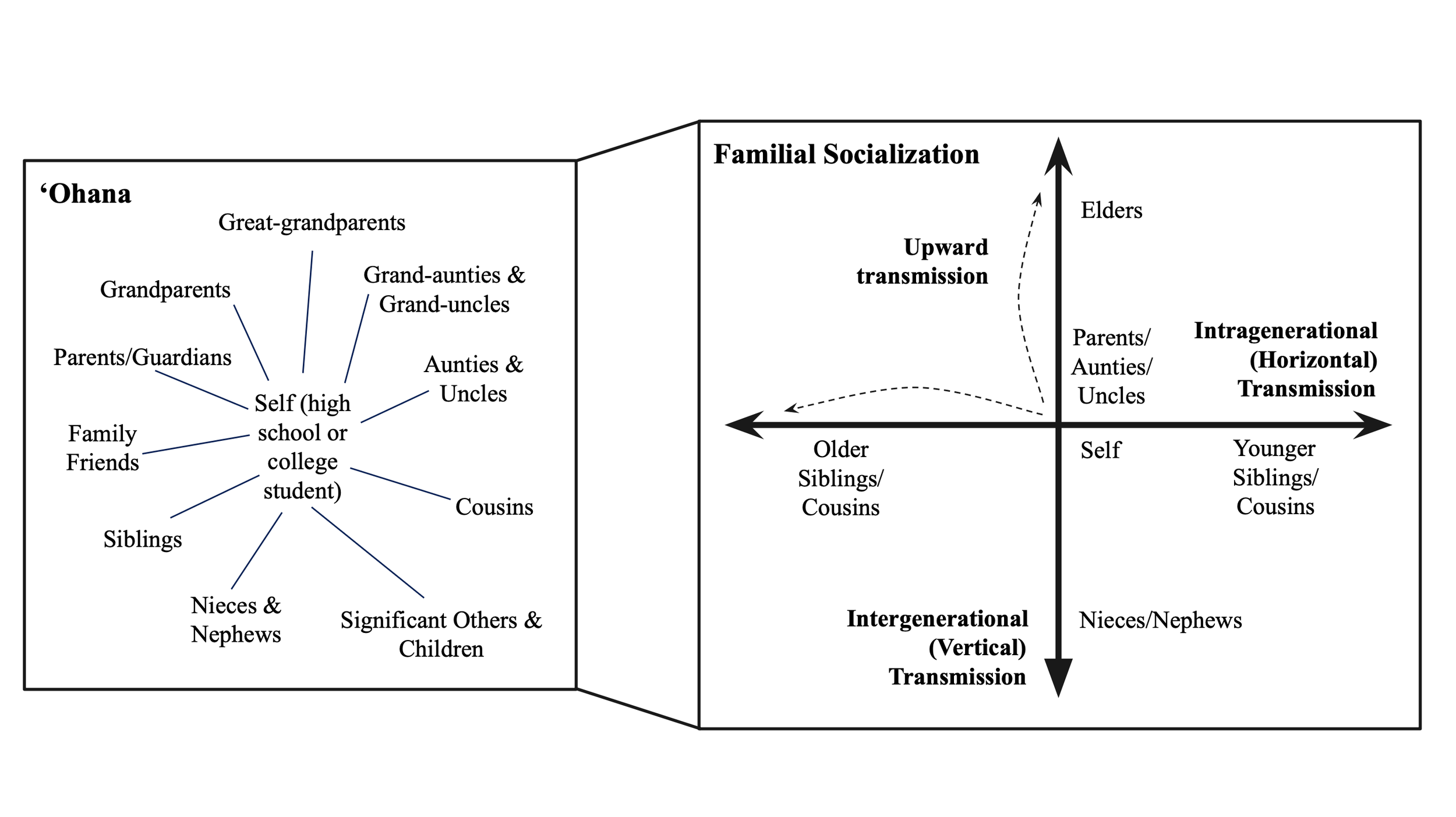E hana mua a paʻa ke kahua ma mua o ke aʻo ana aku ia haʻi.
Build yourself a firm foundation before teaching others.
— ʻŌlelo noʻeau no. 276
Research is a methodical investigation for information with the goal of producing and disseminating knowledge. In essence, a process to answer questions and share your findings.
Throughout history, research has been used as a weapon to discredit Indigenous wisdom, conquer Native nations, and seize ancestral homelands. While colonial approaches to research remain the dominant practice in the U.S. academy, critical and Indigenous methods push back and speak back to intellectual hegemony stemming from research. To learn more about the violent history of research, see Delgado Bernal & Villalpando, 2002; Tuck and Yang, 2014; Tuhiwai Smith, 1999.
Today, I conduct research in education to examine relationships between schooling and society, curriculum and pedagogy, and philosophies of teaching and learning. I also engage in research to affirm the intellectual foundation of Indigenous stories and histories; pedagogies of families, communities, and homes; and culture-based education.
This page contains my researcher positionality, scholarly approach, and research agenda as well as links to projects, publications, and presentations.
Learn more about my ongoing relationship with research
-
Positionality statements explain how one's identities and worldviews influence the research process. Sometimes referred to as "reflexivity," this is a continuous practice in self-reflection to identify personal biases and assumptions in the creation, data collection and analysis, and dissemination of research.
I come to my work as a wahine ʻŌiwi, a first-generation college graduate, an emerging critical race theoretical scholar, and a political advocate for Indigenous sovereignty and Indigenous rights. These identities along with my schooling background and my socialization intersect and continue to influence my belief in Indigenous stories and histories as legitimate wisdom and my prioritization of Indigenous goals and education practices in my research.
-
A scholarly approach is another exercise in self-reflection to name the guiding paradigms, values, and practices that shape how and why scholars engage in research.
Two important thrulines in my research are critical race theory in education/Kanaka ʻŌiwi critical race theory (KanakaʻŌiwiCrit) and Native Hawaiian methodologies. These frameworks form the bedrock of how I conduct research on Native Hawaiians. Consequently, I value collaboration with Indigenous communities in each project I undertake, so I foreground Kanaka ʻŌiwi voices in my scholarship. I treat Indigenous participation in my studies as a gift, and I value transparency and trust when working with students, educators, and community members.
Research Agenda
Research agendas refer to the topics, themes, or lines of inquiry examined through research. It is often a long-term vision of a scholar's goals and commitments.
My research broadly investigates the historical and contemporary consequences of settler colonialism and U.S. hegemony through a Critical Race Theoretical and Native Hawaiian woman epistemological lens, and my agenda aims to generate and articulate culturally-grounded knowledge that aligns with community needs and visions. I center four values in my work: pono (balance, justice), ea (sovereignty, Indigenous life), pilina (relationships), and kuleana (responsibility, role, privilege). Each project I pursue not only interweaves these four values but also engages four areas of research:
Family-school-community relations – What ideologies and discourses are communicated and internalized across educational landscapes? What pedagogical and curricular strengths exist in Indigenous homes, schools, and communities?
Projects: multigenerational resistance to internalized oppression in Native Hawaiian families, culture-based education schools, and majority-Hawaiian communities; intergenerational learning among Native Hawaiian grandmothers-mothers-daughters
Identity formation – What are the varied, lifelong ways that Indigenous Peoples enact self-determined identities in and out of their ancestral homelands? What roles do education and schools play in shaping and stewarding Indigenous ways of knowing and being?
Projects: experiences of Pacific Islander academics in the U.S.; experiences of Asian American, Native Hawaiian, and Pacific Islander K–12 teachers
Defining & measuring (in)equity and (in)access – How are issues of access and equity conceptualized and measured in educational research conducted with and for Indigenous Peoples?
Projects: Academic freedom as a racialized resource in U.S. higher education; impostor syndrome as racial microaggression and internalized racism
Education for social change – What stories and discourses circulating in educational settings transmit capacities for resistance, critical consciousness, and social change among Indigenous Peoples?
Projects: family-based interventions to internalized oppression; culture-based education as self-determination and sovereignty in Hawaiʻi and diaspora
Publications
Kawano, K. (2025). Interweaving the Past, Present, and Future to Call Forth a Critical Race Wāhine ʻŌiwi Epistemology. International Journal of Qualitative Studies in Education. DOI:10.1080/09518398.2025.2572456
Keywords: critical race theory, epistemology, Indigenous education, Native Hawaiian, storytelling
Teranishi, R. T., Kurland, W. M., Kawano, K., Furgiuele, C., & Palbusa, J. (2025). Multiracial Students in the University of California: Perspectives from Analysis on Native Hawaiian and Pacific Islander Students. Oakland, CA: University of California, Office of the President DOI:10.13140/RG.2.2.35329.98403
Keywords: data systems, disaggregation, enrollment counts, maximum representation, multiracial students
Kawano, K. (2025). Enacting Kūʻē through Makawalu Discourse: A KanakaʻŌiwiCrit Study of Native Hawaiian Students. Education for Information, 41(1), 8–31. DOI:10.3233/EFI-240084
Keywords: KanakaʻŌiwiCrit, Native Hawaiian identity, resistance
Kawano, K. (2024). Learning how to “Tease da Otha’ Race:” Ethnic-Racial Socialization through Multicultural Literature. Cambridge Educational Research e-Journal, 30–44. DOI:10.17863/CAM.114543
Keywords: Critical Race Content Analysis, ethnic-racial socialization, multiculturalism, racism
Kawano, K. (2023). Engaging a Kanaka ʻŌiwi Literature Review Methodology through Research on Native Hawaiian Culture-Based Education. Review of Educational Research, 93(6), 862–900. DOI:10.3102/00346543221149004
Keywords: culture-based education, Indigenous methodologies, student praxis
Kawano, K. (2023). Toward a Kanaka ʻŌiwi Racial Identity Model for a Contemporary Multiracial World. Diaspora, Indigenous, and Minority Education, 18(4), 313–329. DOI:10.1080/15595692.2023.2278193
Keywords: identity formation, KanakaʻŌiwiCrit, racial identity
Kawano, K. (2024). Revelations about the Seeds we Planted: Huikau, Kūʻē, and the Lāhui. AlterNative: An International Journal of Indigenous Peoples, 20(3), 428–439. DOI:10.1177/11771801241250063
Keywords: internalized oppression, resistance, social change theory
Current Projects & Resources

















